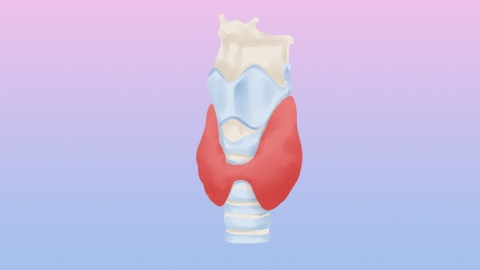How are thyroid nodules caused?
Generally, thyroid nodules may be caused by factors such as age and gender, iodine intake, radioactive exposure, chronic lymphocytic thyroiditis, and thyroid tumors. It is recommended to seek timely medical advice, identify the underlying cause, and undergo appropriate treatment under the guidance of a qualified physician. Detailed explanations are as follows:
1. Age and Gender
With advancing age, thyroid tissue undergoes gradual degenerative changes, and cellular metabolism and repair capacity decline, which may promote nodule formation. Hormonal fluctuations, particularly estrogen levels in women, exert greater influence on thyroid tissue, resulting in a higher incidence of thyroid nodules in women compared to men. These nodules are mostly benign and generally do not require specific treatment. Regular thyroid ultrasound examinations are recommended to monitor changes in nodule size and morphology.
2. Iodine Intake
Iodine is a key raw material for thyroid hormone synthesis. Insufficient iodine intake may lead to compensatory thyroid hyperplasia to enhance hormone production, making nodule formation more likely. Conversely, excessive iodine intake may interfere with normal thyroid function, inhibit hormone synthesis, and potentially induce nodules. A balanced diet should be maintained, ensuring adequate iodine intake through sources such as iodized salt, avoiding both excessive and insufficient consumption.

3. Radioactive Exposure
Exposure to radiation therapy in the head and neck region or prolonged presence in a radioactive environment can damage thyroid cell DNA, leading to abnormal cell proliferation and subsequent nodule formation. These nodules carry a relatively higher risk of malignancy. Unnecessary radioactive exposure should be avoided as much as possible. Patients with existing nodules should follow medical advice for regular follow-up examinations and, when necessary, undergo fine-needle aspiration biopsy.
4. Chronic Lymphocytic Thyroiditis
This is an autoimmune disease wherein the body produces autoantibodies that attack thyroid tissue, causing chronic inflammation. Repeated inflammatory stimulation may lead to thyroid hyperplasia and structural disarray, gradually forming nodules, possibly accompanied by symptoms such as goiter and abnormal thyroid function. Treatment may include medications such as levothyroxine sodium tablets, selenium yeast tablets, and methylprednisolone tablets, as directed by a physician, to regulate thyroid function and reduce inflammation.
5. Thyroid Tumors
Mutations in thyroid cells can lead to abnormal proliferation and the formation of tumorous nodules, including both benign and malignant tumors. Malignant nodules may grow uncontrollably, potentially invading surrounding tissues or metastasizing, posing significant health risks. Cysts with symptoms or suspected malignancy should be evaluated and treated at a reputable hospital, such as through minimally invasive endoscopic thyroid cystectomy.
Maintaining regular sleep patterns, avoiding late nights, ensuring sufficient rest, and enhancing immune function are recommended in daily life. Maintaining a positive mindset and avoiding prolonged mental stress is also important. Regular thyroid ultrasound and thyroid function tests help in early detection of nodules and timely intervention.






